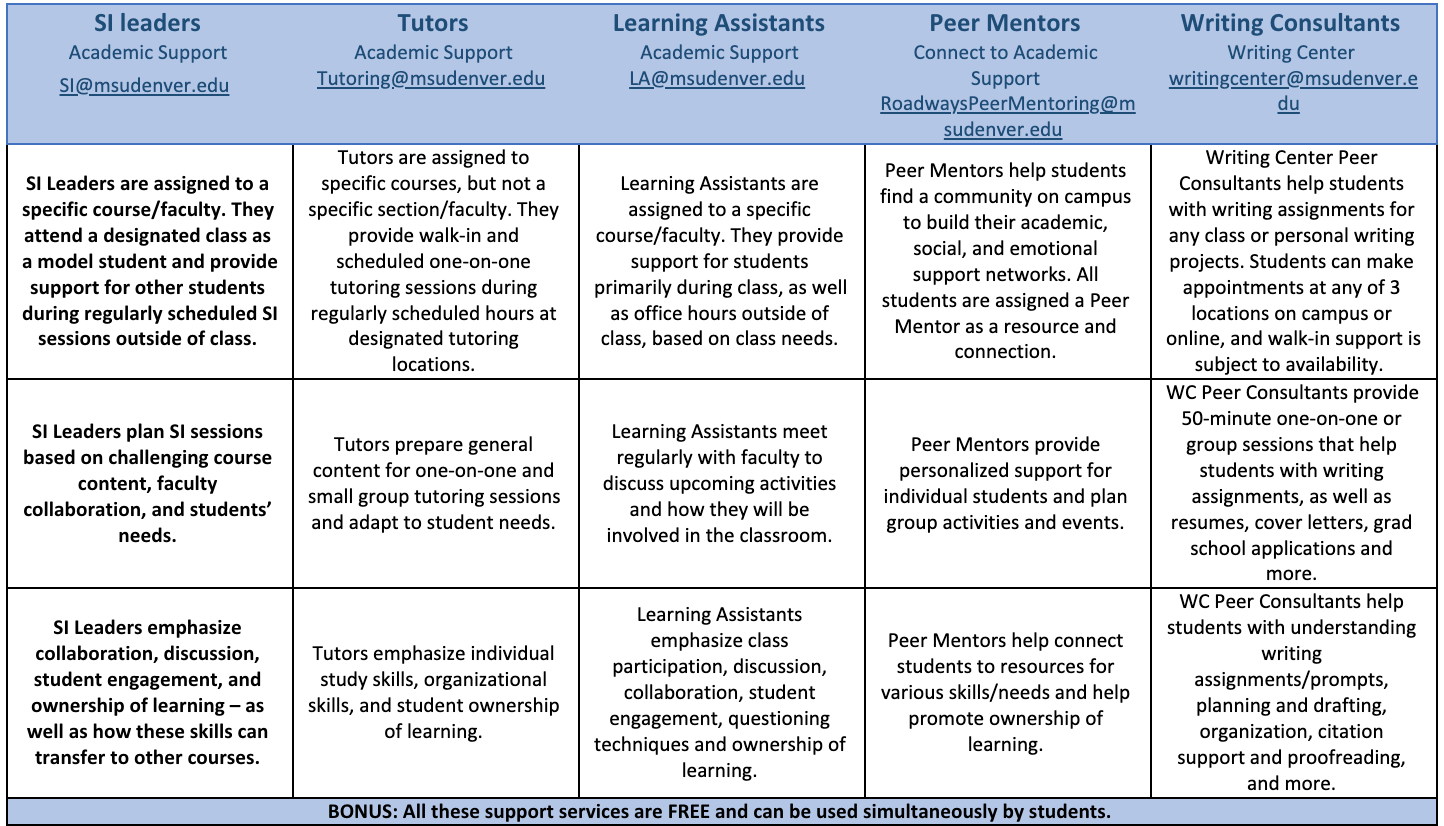Request Information
Ready to find out what MSU Denver can do for you? We’ve got you covered.
Supplemental Instruction (SI) was first developed in 1973 by Dr. Deanna Martin at the University of Missouri at Kansas City. SI is an academic assistance program that provides weekly, peer-led group study sessions for students taking historically difficult, gateway, and bottleneck courses. SI sessions bring students together in a collaborative learning environment where they improve their understanding of course material, review and discuss important concepts, develop study strategies, and prepare for exams. In SI, students connect what to learn with how to learn. SI is provided for all students who want to improve their understanding of course material and improve their grades; SI is not a remedial program for struggling or failing students. Students who attend SI sessions on a consistent basis traditionally earn a half to full letter grade higher than those students who do not participate in SI.
By encouraging regular attendance, SI aims to accomplish these goals through helping students:
MSU Denver offers multiple academic support programs that focus on student success through peer learning. The purpose and role of each leads to a different approach to serving students. There are clear benefits for each program, and students are encouraged to utilize as many programs as will best meet their needs! (Note: Teaching Assistants’ roles and responsibilities typically vary by department, and from Undergraduate to Graduate TAs.)

Advisors strive to keep up to date on campus and community resources that are available to students. Advisors typically refer students to a wide variety of campus resources, including financial aid, counseling, tutoring, career advising, etc. It is your guidance that aids in the success of our students at MSU Denver and advisor support is critical to the SI Program’s success. Supplemental Instruction has become increasingly popular on college campuses, and academic advisors should encourage students to take advantage of this service if it is available. SI is an effective way for students to be successful not only in difficult courses, but to take the in their introductory courses. Advisers are ideally positioned to suggest to students that they participate in SI sessions.
How Do Students Benefit From SI
Stone and Jacobs (2008) found a number of benefits to students participating in SI. For example, SI students are less likely to earn grades of D or F or withdraw and are more likely to earn higher final grades than students who do not participate in SI, and their institutions are more likely to retain them. Promote the benefits of SI to skeptical students. Students who participate in SI tend to earn higher grades on exams and higher final grades than students who do not attend. Students who participate are also less likely to earn Ds or Fs or withdraw from the course (Stone & Jacobs, 2008).
Although there are not many research studies focusing on benefits to the students who serve as SI leaders, some studies have shown that SI increases communication skills, faculty interaction, and knowledge of the material (Stone & Jacobs, 2008). At MSU Denver, Supplemental Instruction has had a large impact on retention rates as well as increased course grades. The SI program began collecting retention and DFW rates data in 2016. Between 2016-2018, the retention rate rose 12% for those who participated in SI versus those who did not. Our most recent data, Fall 2019, demonstrates that continued trend with almost a 15% lower DFW rate for those utilizing SI than those who did not. It is our goal at SI to continue to improve retention numbers as well as decrease DFW rates across multiple departments and courses across the university.
Encourage Students to Attend SI
The most important piece for Advisors is our SI Website. When you are advising your students, please feel free to log onto our site for the most up to date courses, sections, and SI session days/times.
A Few Additional Tips:
Come visit an SI session!
As an advisor, we welcome you to attend an SI session. This is a great way to see our leaders in action with our students. Please feel free to contact SI about attending a session or use our website to drop into a session that fits your schedule.
Advisors can also encourage students to apply to become SI leaders after they successfully complete courses that offered supplemental instruction. Our SI program requires the follow for potential SI Leaders:
We will contact you when our application for the upcoming semester is posted! Also, feel free to have potential students contact SI directly at [email protected].
For further information, please contact us via email or visit us in person at MSU Denver Tutoring in the Jordan Student Success Building, Suite 220.
Supplemental InstructionOffice Email:
[email protected]
Campus Location
JSSB Suite 220
Mailing Address
Metropolitan State University of Denver
Tutoring
Campus Box 62
PO Box 173362
Denver, CO 80217-3362
USA